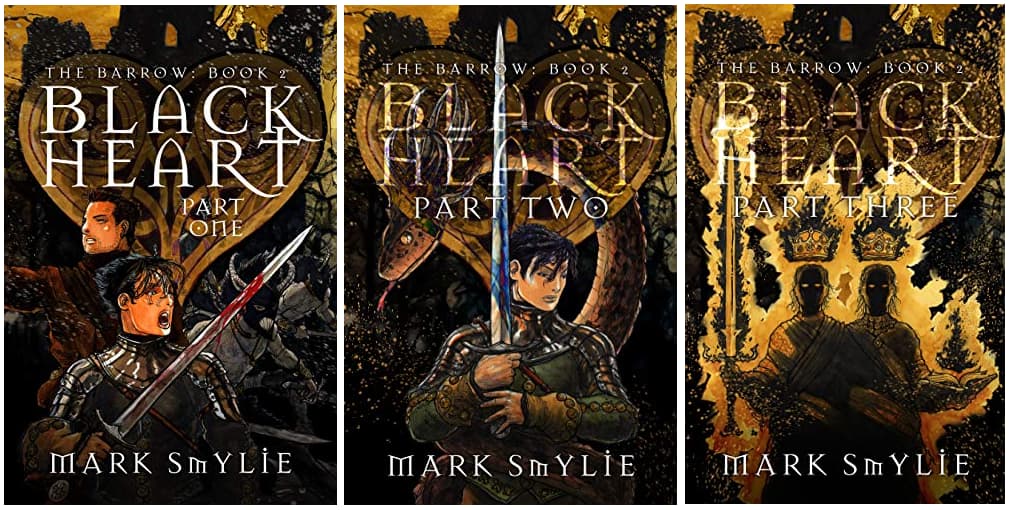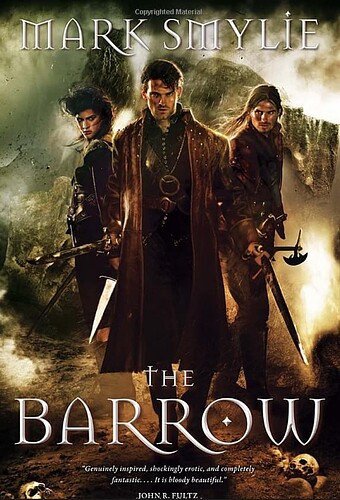It’s not a book, but it is a treat: a free short story by Stephen Graham Jones in his distinctive voice:
The Abbot’s Gibbet by Michael Jenks
This is apparently book 5 of 30+ in A Knights Templar Mystery series. I think I bought this at a library used book sale after having read some other book based in the middle ages. The book itself, while an easy read, was just so so. The author really does nothing to bring his characters to life, so maybe being the 5th book in a series he felt he didn’t need to. He also doesn’t really describe the time and place very much. As for the mystery itself it involves a murder in a town having it’s annual trade fair to raise money for the local Abbey.
I find it hard to recommend this book because of how shallow the characters are and how little description the author gives of the town and it’s times, but as 30+ books were written in this series they must have appealed to someone.
Maybe try the Brother Cadfael mysteries instead?
Cadfael mysteries are excellent. My wife adores them, and they’re so historically sound that my university history professor used to assign them as reading to get a sense of the period.
Cadfael is good, but also CJ Sansom’s Matthew Shardlake series are very good.
I have seen the Cadfael books so I will give them a try. Also the Shardlake series if I see it.
Nerve by Dick Francis
Yea, I bought several Dick Francis paperbacks at a library sale years ago and I am still going thru them. I read this while waiting for the third book in Abercrombie’s new series to drop, as the paperback version is supposed to come out Friday.
Anyway, this was an interesting read. No murders, which in my experience is unusual for a Dick Francis novel. The plot revolves around a steeplechase jockey early in his career and his first break into the big time. Then things hit the fan and the mystery ensues. The main character is very good, but the story kind of breaks down near the end. This was a very easy read and despite the plotting at the end I enjoyed it.
EDIT: Well damn, a quick check shows the paperback isn’t due out until 08-02 now.
Be on the lookout for sales on the Cadfael books, I think I’ve gotten the whole series @ $1.99 over the years…
Yeah, the Cadfael books are always going on sale.
I think I have read every one.
They were enjoyable, even though they relied on lots of formula.
However, after he died, I never tried any of the ones being written by his son.
Has anyone here read any of them?
I read Black Heart, the second book in Mark Smylie’s Barrow trilogy. The second book was broken up into 3 smaller chunks that were published separately:
- Words on Wind, Adrift on Dreams of Splendor
- In the Coils of a Horned Serpent
- and finally, The Sacrificial Altar
The second book continues on nearly immediately after the events of the first book, The Barrow:
which itself is a sort of prequel/side-story to his Artesia comics:
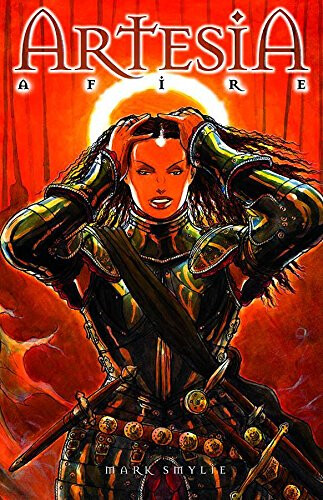
Which are set in the world/cosmology that he lays out in his RPG System, Artesia: Adventures in the Known world
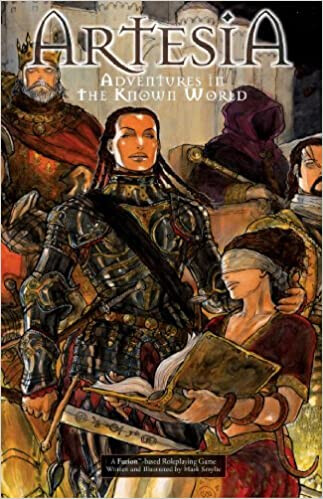
To properly appreciate the book, what you really want to do is read the RPG, then the comics, then the Barrow, then the 3 chunks of Black Heart. Mark Smylie is this rare triple threat of artist, writer, and game designer. He’s shockingly good at all of them, and over the last 30 years he has embarked on a Glorantha-like project of creating a world & its history, all the way up from its mythical roots to its somewhat more grounded current day. Or to draw on another example, it’s a bit like if Tolkien designed a game system first, and then wrote his books afterwards according to the setting & mechanics of his game system. There is a reason that people are regularly breaking out into song & poetry, it is for the stat bonus’s!
The books and the comics take place in one part of that current day setting, as the inhabitants of a failed-state medieval kingdom deal with bandits, cultists, political intrigue, invasion, and maybe a little bit of an apocalypse. It’s neat! Smylie has excellent basic skills as a writer, but he is also all over the place in a way that you don’t really find in fantasy authors. E.g. he writes great scenes of action-terror as people try to deal with the bullshit that they find in dungeons, he writes political intrigue, ecstatic visions, a number of extremely horny people, a number of extremely evil people, long scholarly monologues about his world & its history & pantheons, etc. etc. Also, as a comic artist, Smylie has to be able to actually draw his characters, and so he is way more into the details of clothing, armor, and weapons than 99% of authors would be. It’s all over the place & its great. The two main threads tying the stories together are the estranged brother/sister pair of Artesia & Stepjan. They’re both wildly overpowered, and they both absolutely live for drama. The books follow them and about 100 other characters as they help drive the kingdom’s stability down to -3.
Oh right and the first “adventure” from The Barrow is free online:
It’s a riff on the D&D1e cover:
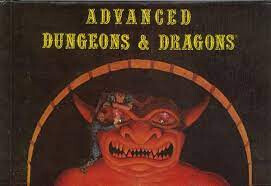
as some people try to pillage a statue. If you like it, you’ll probably like the rest of his writing, and if not, then not.
The 2021 Nebula Winners have been announced:
What’s particularly striking to me is how different this list is from the '21 Hugos - there really seems to be far less overlap than is common between the two. Lots of interesting stuff to check out!
I just finished the first 4 books in this series (all that have been written):
Quite good! Not quite as good as, say, Futuristic Violence and Fancy Suits, but very much a B+/A- effort if you like modern-setting sci-fi/fantasy/superhero-ish stuff.
I finished Black Sun by Rebecca Roanhorse, a Nebula nominee from 2020. It was… ok? I actually got interrupted in the middle (got something else from the library when I was in the middle of it), and I was afraid I wouldn’t remember what was going on when I got back to it. But, it turns out… there wasn’t much to remember. The plot of this book is very thin, I could probably explain the entire thing in three sentences.
I guess the claim to fame of this book is that it is a fantasy novel which doesn’t take place in a Western Europe analog, which I wasn’t really aware was that unusual. I mean, Game of Thrones, obviously, and I guess Lord of the Rings, sorta. I suppose I read more science fiction than fantasy, so maybe I don’t know. It was supposed to be based on Meso-American history, I guess.
The main knock I have with this book is it is not a complete story. It ends pretty much right at the climax of the story. It ends very abruptly. The second book (of a planned trilogy, apparently) is out now, but the third isn’t. So, I’d recommend waiting on this one until they’re all available.
I’ve read some books recently:
I finished the Crimson Empire trilogy (A Crown for Cold Silver, etc) by Alex Marshall and hugely enjoyed it start to finish. It shows up in grimdark lists, but the author is far too sentimental about his characters for it to really be grimdark. It’s a satisfying, optimistic read and churned no guts in the time I read it. There is plenty of violence and gore. And lots of joyful copulation. Bad things happen to characters, but as I said above, they all keep their dignity and agency intact. Just a ton of fun; great battle sequences, cool monsters, dangerous magic, capricious wizards, badass warrior queens, demons, pirates, barbarians, etc etc. Recommended.
I read Paul Tremblay’s A Head Full of Ghosts. Tremblay is, I gather, a new wunderkind of horror. This novel was… a bit pat. It’s self aware and self aware about its self awareness. Stuff happens that is clearly referencing well-worn horror tropes and then the book talks about that, then it talks about how talking about it is also a trope. The story works well, but I’m not sure I’m sold on this style of self-referential horror. I mean My Heart is a Chainsaw, Final Girl Support Group, Scream 1/2/3/4/5/6/7, Final Girl the game, FInal Girl the film, how many of these do we need? Let’s have horror get back to being scary instead of trying to exhume and animate a meta-mythology of the genre.
I’m nearly finished with MR Carey’s The Book of Koli, which is the first in a trilogy. I thought Carey’s famous novel The Girl with All the Gifts was fine: an enjoyable beach read. Koli, on the other hand, is as relentlessly compelling as a great thriller and as fascinating as an inventive fantasy. It is set in a world where animals and plants and especially trees are all quite dangerous and hostile toward humans. Half the fun of this novel is figuring out what’s going on and Koli (the main character) has a unique narrative voice and very consistent perspective from which to view the world. The audiobook narrator, Theo Solomon, is really good, perfectly capturing the nuances of the dialect Koli uses. Recommended.
FWIW, Head Full of Ghosts came out seven years ago and predates a lot (but not all) of that.
That’s fair, and there’s no doubt that Tremblay’s book is well written. His prose is really good and his writing is solid. I guess my frustration is with what’s facing outward from the genre more generally so that every story feels like attending a horror convention–with panels on tropes and history and horror nerds gleefully swapping trivia–instead of experiencing a scary narrative.
I see the Kindle version is $2 right now.
I libraried the ebooks with neither muss nor fuss.
House of Chains by Steven Erikson
This is the fourth book in the “A Tale of the Malazan Book of the Fallen” series.
This book ties into a story began in book 2. I really enjoyed this book even though Erikson loves to introduce so many new characters with each book that you spend a lot of time trying to remember what character has done what. The books make me think of a RPG game where you get to play the different characters and do their quests. Not to say that it isn’t well written, just that it is crowded with people and plot.
This book went a little lighter on the gods and warrens story line, or maybe I am just settling into those parts easier now. Some of the gods have become very interesting characters, and I have become less concerned with trying to remember all the warren info and lore he likes to give. This book went over 1,000 pages, but I read it in two weeks or so, which is quick for me.
I’ve been lax in keeping you all updated on my reading habits. I know it’s top of mind for many of you.
The Doors of Eden by Adrian Tchiakovsky was very, very good. It’s quite long (600-odd pages) but paced like a thriller so it goes by quickly. As a thriller I found it pretty compelling, trying to figure out who’s behind all the stuff and if they’ll be able to beat the bad guys and so on (with the disclaimer that I’m not really a thriller reader). The sci-fi hook was also very well done, I think, and I now know a bit more about the various epochs of earth’s geological/biological history than I did before, and even better, want to learn more about e.g. the Permian extinction.
The only complaints I have about are minor (the resolution at the end seemed a bit too pat and feel-good-diversity-and-inclusion-is-the-solution) and trivial (the interludes were written by a professor at the “University of California”, which, as anyone who’s been in academia anywhere near the UC system knows, is not how you describe your affiliation, it’s always the “University of California at [blank]”, because there’s a gradation between the campuses and everyone damn well wants you to know it).
The Cloud Roads by Martha Wells was also pretty good. You may know Martha Wells from her Murderbot series, and I think her fantasy worldbuilding here is probably just as good as that in the Murderbot stories (though it’s been a while since I read them). The story focuses on avian shapeshifters with a particular social structure, and it uses an outsider as the main character to explain things to the reader (I briefly tried to find the TV Tropes article on this trope but couldn’t think of the name). My complaint is just that the main character suffered a bit from whiny-broody-young-man syndrome (think Harry Potter, Hamlet, etc) which is a pet peeve of mine. Still, I’ll look up the sequel.
Robopocalypse by Daniel Howard Wilson was recommended by @inactive_user, I’m pretty sure, though I scrolled up a while to try to find it but gave up because I’m lazy, and I’m not confident I could use Discourse’s search without jeopardizing all the typing I’ve already done here. It was definitely a fun read, but felt a bit more like someone was writing a book drawn from a game, in a weird way. It seemed like they had thought out the course of this robot uprising and then added characters and scenery as mostly window-dressing to move the plot along. The little summary bits before and after each vignette that tied the events depicted to the overall course of the war really reinforced this idea to me. Nevertheless, it was a fun and quick read, and I appreciate the recommendation. It brings World War Z to mind–I think it’s pretty similar in style, though WWZ was a much better book (though it was a while ago that I read it).
Lincoln in the Bardo by George Saunders is undoubtedly the “best” book of the bunch (Booker Prize winner! I didn’t know they gave that to Americans). Reading about it after the fact, everyone seems to have been blown away by how “experimental” it was, but honestly, it wasn’t that weird. It was written kind of like a play, with multiple voices going back and forth, and some of the chapters were the author’s characters, and some of the chapters were excerpts from historical sources laid out as if they were lines in a play. (I think the historical sources were real, in that I recognized some of the books (e.g. A Team of Rivals), but they could have been fictional, too.) Once I paused to work out what was going on (after the first ten pages), it didn’t feel like I was reading an experimental novel, just a good one.
It really made me reflect on life and death, and what regrets we’re carrying with us or leaving behind. It was a tough read–not because of literary obscurity or anything like that, but because there’s a lot of sadness, as it’s focused around the death of a child. Still, I found it hopeful in the end.
I strongly recommend it, especially to anyone who’s big-L Literature Curious, but maybe has been intimidated by (or lacking patience for) the other favorites of the literati. You don’t need an English degree or anything (though I’m sure there’s plenty of stuff I missed), and it’s not too hard to make sense of (on a basic level, at least). I really thought it would be overly pretentious (especially as the author bio lists him as one of Time’s 100 most influential people, ugh), but it absolutely wasn’t. It was just good.
